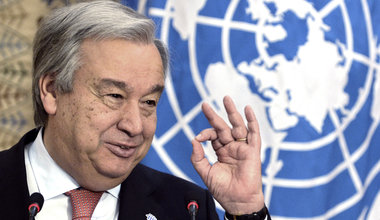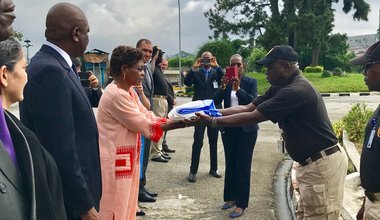Daily Brief on Côte d’Ivoire for Tuesday, 23 December 2008
Highlights
·
Agreement reached on Fourth
Ouagadougou complementary accord;
·
SRSG inaugurates quick impact
project in San Pedro'
·
Payment of "soap allowances"
begins in Bouaké
Agreement reached on Fourth Ouagadougou
complementary accord
The Chief of Staff of the Armed Forces of the
Forces Nouvelles (FAFN), General Soumaila Bakayoko and Interior Minister Désiré
Tagro, yesterday initialed the fourth complementary accord to the March 2007
Ouagadougou Political Agreement. The accord, which deals primarily with
outstanding military questions, states that 5,000 ex-combatants from the FAFN
will be integrated into the Defence and Security Forces of Côte d'Ivoire
(FDS-CI). It is to be signed by President Laurent Gbagbo, Prime Minister
Guillaume Soro and Facilitator Blaise Compaoré in the coming days. Some details
of the accord have been delegated to a special commission to be headed by a
member of parliament from the Ivorian Popular Front (FPI), which is the
presidential party.
SRSG inaugurates Quick Impact Project
The Special Representative of the
Secretary-General for Côte d'Ivoire, Mr. Y.J. Choi, this morning inaugurated a
quick impact project involving the building of three classrooms at a primary
school in Poro village, six kilometers from the southwestern town of San Pedro.
The ceremony was attended by the Prefet of the region, the Swiss Ambassador and
his spouse and the head of the UN Operation in Côte d'Ivoire (UNOCI) Senegalese
battalion based in San Pedro. Special Representative Choi spoke about the need
to do all that is possible to improve educational facilities around the country
in order to invest in the future generations of Ivoirians. The SRSG visited a
cultural centre and another quick impact project implemented by the Senegalese
battalion, before leaving San Pedro for Abidjan.
Identification and voter registration
Identification and voter registration continues.
In the north of the country, UNOCI learned that the local commission of the
Independent Electoral Commission of Korhogo will stop working for the holidays.
In the northeastern town of Bouna, people working at identification and voter
registration centres for the National Institute of Statistics (INS) went on
strike today to protest against the non-payment of their emoluments. In
Bondoukou, seven out of 22 centers opened for business this morning. In the
Beoumi/Sakassou area, near Bouaké, the identification process is moving from the
large population centers towards the more rural, remote communes. UNOCI
continues to assist with transportation, while police and military from the
Operation continue to patrol in areas where collection centers are open.
DDR
The newly established Office for coordination of
the demobilization of former FAFN soldiers today began the payment of allowances
to demobilized soldiers in Bouaké. The allowance, which amounts to 10.000 CFA
francs per head, is known as the "soap allowance" and it is intended to help
soldiers meet their monthly expenditure. The payment of the allowance had been
delayed for several months due to management problems. It is to be noted that
the process of demobilizing former FAFN soldiers started on May 2 this year and
the overall demobilization target is 26,000 former combatants for the whole CNO
(Center-North-West), the zone that was formerly under the control of the Forces
Nouvelles. The new office operates under the direct supervision of the General
Secretariat of the Forces Nouvelles.
Human Rights
From 17 to 18 December, in the western town of
Danané, near the border with Liberia, the Human Rights Division, in
collaboration with the local office of the Danish Refugee Council, an
international NGO, organised a two-day training on (sexual) violence against
women primarily for FAFN elements posted at the Liberian and Guinean borders.
The aim of the training was to sensitize these elements on the prevention of
(sexual) violence against women. Twenty-five participants, including
representatives of local peace committees and women's organisations, were
extensively briefed on different aspects of the prevention of gender-based
violence and on related national and international human rights instruments.
End
 ONU
ONU Nations Unies Maintien de la paix
Nations Unies Maintien de la paix



